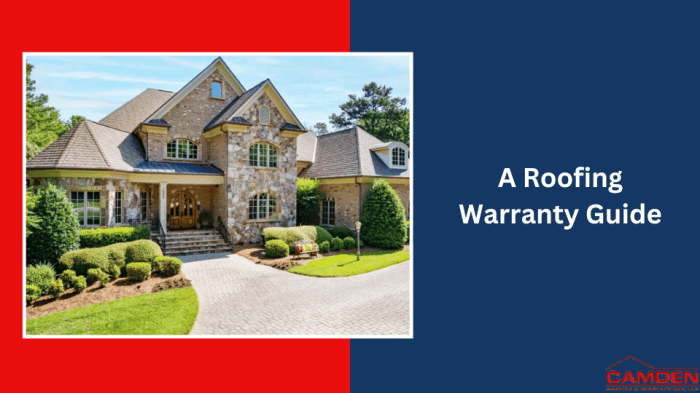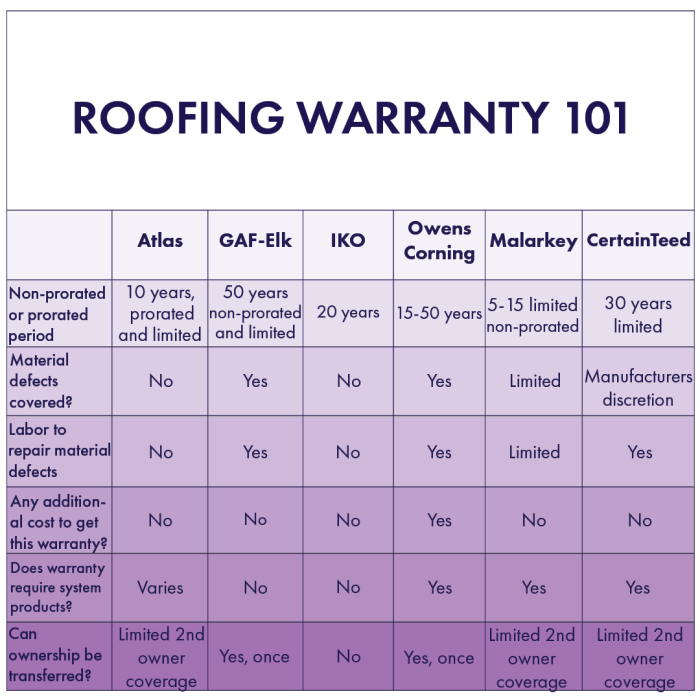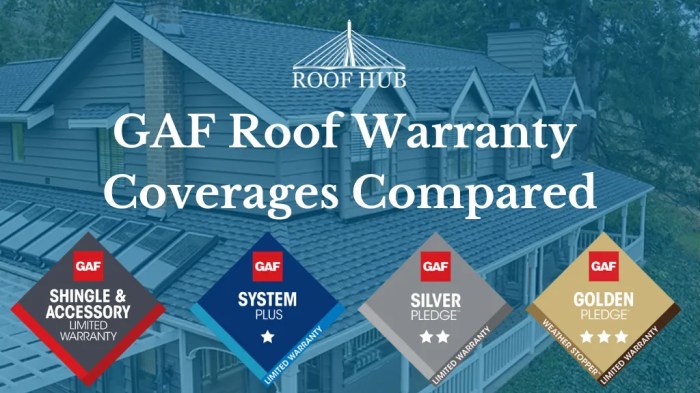Exploring Roofing Warranty Options: A Comprehensive Guide
By admin
7 mins to read
As we delve into the realm of roofing warranty options, a world of choices and considerations unfolds before us. From understanding the different types of warranties to weighing the factors that matter most, this guide aims to shed light on the crucial aspects homeowners should know when it comes to protecting their roof investment.
Let's navigate through the intricacies of roofing warranties, exploring the nuances that define each option and the implications they hold for homeowners seeking peace of mind and long-term protection for their roofs.
Table of Contents
ToggleTypes of Roofing Warranties
When it comes to roofing warranties, there are different types available in the market to provide homeowners with peace of mind and protection for their investment. Let's explore the key differences between manufacturer warranties and contractor warranties, along with their benefits and limitations.
Manufacturer Warranties
Manufacturer warranties are typically provided by the company that produces the roofing materials. These warranties offer coverage for defects in the materials themselves and can vary in duration, ranging from 20 years to a lifetime. Manufacturer warranties often cover issues such as leaks, cracking, and premature deterioration of the roofing materials.
- Benefits:
- Protection against material defects
- Potential for long-term coverage
- Peace of mind knowing the materials are backed by a reputable company
- Limitations:
- May not cover labor costs for repairs
- Strict requirements for warranty claims
- Exclusions for natural disasters or improper installation
Contractor Warranties
Contractor warranties, on the other hand, are provided by the roofing installation company and cover the workmanship and installation of the roof. These warranties typically have a shorter duration compared to manufacturer warranties, usually ranging from one to ten years.
Contractor warranties ensure that the roof is installed correctly and that any issues arising from the installation are addressed.
- Benefits:
- Coverage for labor and installation issues
- Quick response for repairs or adjustments
- Personalized service from the roofing contractor
- Limitations:
- May not cover material defects
- Dependent on the reputation and longevity of the roofing contractor
- Exclusions for damage from external factors
Overall, both manufacturer warranties and contractor warranties play a crucial role in protecting your roof investment. It's essential to carefully review the terms and conditions of each warranty to understand what is covered and what is not, ensuring that you have the appropriate coverage for your specific needs.
Factors to Consider When Choosing a Roofing Warranty

When selecting a roofing warranty, homeowners must carefully consider various factors to ensure they have adequate protection for their investment. Factors such as warranty length, coverage options, transferability, and the type of roofing material used can significantly impact the overall value and effectiveness of the warranty.
Importance of Warranty Length and Coverage Options
Warranty length and coverage options are crucial factors to consider when choosing a roofing warranty. A longer warranty period provides homeowners with extended protection against potential defects or damages that may arise over time. Additionally, comprehensive coverage options that include protection against a wide range of issues, such as leaks, material defects, or workmanship errors, offer homeowners greater peace of mind and financial security.
Significance of Warranty Transferability
Warranty transferability is another essential consideration when selecting a roofing warranty. A transferable warranty can add value to the home by providing future buyers with the assurance that the roof is covered under warranty. This can make the property more attractive to potential buyers and potentially increase its resale value.
Homeowners should carefully review the transferability terms of the warranty to ensure that it meets their needs.
Impact of Roofing Material on Warranty Coverage
The type of roofing material used can also affect the coverage and terms of the warranty. Different roofing materials, such as asphalt shingles, metal, or tile, may have varying warranty requirements and limitations
Homeowners should consider how their choice of roofing material aligns with the warranty coverage being offered to ensure they are fully protected.
Understanding Warranty Coverage

When it comes to understanding roofing warranty coverage, it's essential to know what is typically covered and what exclusions may apply. Additionally, how weather-related damages are handled and the process of filing a claim are crucial aspects for homeowners to be aware of.
What is Typically Covered
Standard roofing warranties often cover defects in materials or workmanship for a certain period. This means that if your roof experiences issues due to faulty materials or improper installation, the warranty may cover the costs of repair or replacement.
Common Exclusions
- Normal wear and tear
- Damage caused by lack of maintenance
- Natural disasters such as earthquakes or hurricanes
- Damage from unauthorized repairs or modifications
Weather-Related Damages
Weather-related damages are typically handled differently in roofing warranties. While some warranties may cover damages from specific weather events, others may exclude coverage for certain types of weather-related issues. It's important to carefully review the warranty to understand what is included in terms of weather-related damages.
Filing a Claim
When filing a claim under a roofing warranty, homeowners need to follow specific procedures Artikeld in the warranty documentation. This may include notifying the warranty provider promptly, providing documentation of the issue, and allowing for an inspection of the roof.
Failure to follow these steps could result in denial of the claim, so it's crucial for homeowners to be proactive in the claims process.
Extended Warranty Options
When it comes to roofing systems, extended warranties can provide homeowners with added peace of mind and protection. These extended warranties typically offer additional coverage beyond the standard warranty, ensuring that your roof is protected for a longer period of time.
Benefits of Extended Warranties
Extended warranties for roofing systems often come with a range of benefits, such as:
- Extended coverage for repairs and replacements
- Transferability to new homeowners
- Enhanced protection against specific types of damage
- Potential discounts on insurance premiums
Cost Implications
While extended warranties can provide valuable benefits, they do come at an additional cost. Homeowners should carefully consider the cost implications of opting for an extended warranty and weigh them against the potential benefits. It's important to factor in the initial cost of the warranty, as well as any potential deductibles or out-of-pocket expenses that may arise.
Evaluating Worth of Investment
To determine whether an extended warranty is worth the investment, homeowners should consider factors such as:
- The age and condition of the roof
- The likelihood of damage or need for repairs in the future
- The length of the extended warranty and what it covers
- Comparing the cost of the warranty to potential repair or replacement expenses
Last Recap

In conclusion, roofing warranty options offer a spectrum of choices for homeowners, each with its own set of benefits and limitations. By understanding the types of warranties available, considering key factors, and grasping the nuances of coverage, homeowners can make informed decisions to safeguard their roofs for years to come.
Whether opting for standard warranties or exploring extended options, the key lies in choosing wisely and ensuring that your roof remains a sturdy shield over your home.
Clarifying Questions
What are the common terms and conditions found in roofing warranties?
Common terms include coverage duration, exclusions, maintenance requirements, and limitations on transferability.
How does warranty coverage vary based on the roofing material used?
Warranty coverage can vary depending on the type of roofing material, with some materials having longer warranty periods or specific coverage for certain damages.
What should homeowners do to ensure coverage when filing a claim?
Homeowners should document damages thoroughly, follow the claim process Artikeld by the warranty provider, and ensure that repairs are carried out by authorized professionals.
Related posts
Choosing the Best Residential Painting Company Near Me: A Comprehensive Guide
Crafting Excellence: A Spotlight on Hickory Roofing Siding Inc
Creating Stunning Custom Patio Designs for Homes
Composite vs Wood Decking: A Comprehensive Comparison
Featured Posts
- How to Choose Between Leasing and Financing a Vehicle: A Comprehensive Guide
- What to Include in a Fleet Preventive Maintenance Schedule: A Comprehensive Guide
- 10 Best Websites to Sell Your Car Online in 2025: Top Platforms for Selling Your Vehicle
- How to Maximize ROI from Preventive Fleet Maintenance
- How to Choose the Right Type of Car Insurance for You: A Comprehensive Guide
Tags
architecture (2) Automotive Protection (1) CarShield (1) Car Warranty (1) construction (2) design trends (2) Endurance (1) Endurance Warranty (1) Energy Efficiency (2) Exterior Design (2) Financing (2) Fleet Management (2) home improvement (11) Interior Design (2) maintenance (2) Major Repairs (1) Minimalist decor (1) Nordic design (1) options (1) outdoor living (2) outstanding loan balance (1) replacement windows (1) roofing (4) Scandinavian interiors (1) selling a car (1) siding (2) siding materials (2) Vehicle Coverage (2) warranty (1) Warranty Plans (1)
Categories
- Automotive (4)
- Car Maintenance (1)
- Car Selling (1)
- Design (2)
- Finance (1)
- Fleet Maintenance (1)
- Fleet Management (1)
- General (30)
- Home Decor (1)
- Home Improvement (12)
- Home Maintenance (1)
- Home Renovation (1)
- Home Services (1)
- Insurance (1)
- Outdoor Living (1)
- Sustainable Living (1)

